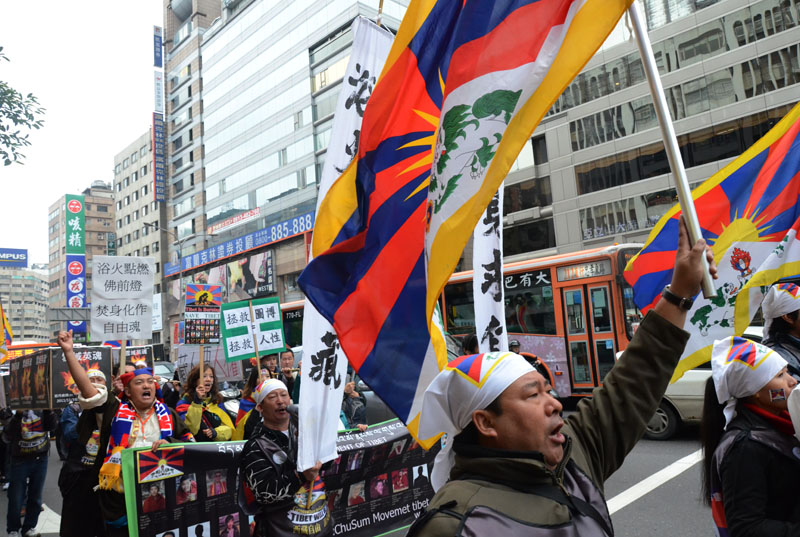 Taipei: Tibetan community members and supporters in Taipei, the capital of Taiwan have joined the worldwide commemorations of the March 10 Tibetan National Uprising that occurred in 1959 in Tibetan capital Lhasa, after a half century of the Chinese invasion of Tibet and to remember the Tibetans who have set themselves on fire to protest China's violation of their freedoms of religion and expression.
Taipei: Tibetan community members and supporters in Taipei, the capital of Taiwan have joined the worldwide commemorations of the March 10 Tibetan National Uprising that occurred in 1959 in Tibetan capital Lhasa, after a half century of the Chinese invasion of Tibet and to remember the Tibetans who have set themselves on fire to protest China's violation of their freedoms of religion and expression.
An ocean of Tibetan flags, banners and supporters marched through the busy streets of Taipei amid a head-turning outpouring of solidarity as 53rd Anniversary of Tibetan national uprising was marked in Taiwan.
Here in Taipei, carrying model coffins covered with Tibetan flags and with pictures of the 28 Tibetans who have self-immolated in protest at Chinese rule in Tibet since March last year, 18 of whom have died, and following banners that read "Burned for Tibet" and "Immolated for freedom," nearly 1000 Tibetans and supporters chanting slogans marched from the Zhongxiao Fuxing MRT station to Taipei 101. Fifiteen members of various Tibetan NGOs from India who are currently visiting Taiwan also have participated Taipei March.
Tibet was an independent country until the Chinese invasion in 1950, which turned us into refugees," Regional Tibetan Youth Congress Taiwan president Tenzin Chompel told demonstrators before they began their march. "Since 1950, we Tibetans have been fighting for our freedom, and recently 28 people set themselves on fire for our freedom and religion."
Tibetans have never ceased their resistance to Chinese occupation since the invasion in 1950. In 1959, a large-scale uprising occurred, leading to a brutal crackdown by the Chinese, and the escape of the 14th Dalai Lama across the Himalayas into Tibet.
"For [exiled Tibetans'] right to go home and for the independence of our country, we will continue the struggle," Tenzin Chompel said.
Taiwan Friends of Tibet president Chow Mei-li called on Taiwanese to show their support for the Tibetans' struggle, because the majority of Taiwanese, like Tibetans, are Buddhists.
She also urged President Ma Ying-jeou's government to speak out on Tibet and current Chinese crackdowns in the Himalayan region.
"When President Ma keeps silent as Tibetans suffer, he is an accomplice," she said. "Ma should stop all cross-strait religious exchanges until China withdraws armed forces from Tibetan temples and monasteries."
A number of Democratic Progressive Party (DPP) politicians - including legislators Tuan Yi-kang, Yu Mei-nu, Chen Chieh-ju, Taipei City Councilor Chien Yu-yen, former Tainan County commissioner Su Huan-chih and DPP deputy secretary-general Kao Chien-chih - took part in the march.
"I'm ashamed to be the citizen of a country where government officials have close ties with Chinese officials and pretend they do not see what is happening in Tibet - I apologize to you [Tibetans] for it," Tuan said. "But I assure you that not all Taiwanese are cowards like our government officials."
Once the parade reached Sun Yat-sen Memorial Hall, all of the marchers lay down on the road in silence for three minutes in memory of Tibetans who had sacrificed their lives for the Tibetan cause.
"When you lie on the street, think of the Tibetans who fell on the soil of Tibet because they were shot by Chinese troops as they took to the streets calling for freedom, just as we are doing now," one parade organizer said.
In addition to Tibetans and their Taiwanese supporters, there were participants from many countries.
"The Tibetan situation is getting more and more severe, and it's unacceptable to anyone in the world. That's why people in many countries around the world are taking to the streets today to express their support for Tibet," said Julie Couderc, a French national and doctoral student at National Taiwan University's Graduate Institute of National Development. "This is also why I feel that I must come here to stay with the Tibetans - human rights is the most fundamental thing."
Amnesty International Taiwan board member Tashi Tsering, an Indian-born Tibetan-Taiwanese, thanked the Taiwanese for their support, which, he said, made them proud of telling exiled Tibetans in India that they are from Taiwan.
"I've been in Taiwan for 14 years. Ten years ago, we felt ashamed to tell other Tibetans that we're from Taiwan, because at the time, no one knew about the Tibetan issue, and that the government considered Tibet an inseparable part of the Republic of China," Tashi said.
"Now we're proud to tell other Tibetans where we're from, because all Tibetans living in exile or within Tibet can see how supportive the Taiwanese are of our struggle for freedom," Tashi said.


![Tibet has a rich history as a sovereign nation until the 1950s when it was invaded by China. [Photo: File]](/images/stories/Pics-2024/March/Tibet-Nation-1940s.jpg#joomlaImage://local-images/stories/Pics-2024/March/Tibet-Nation-1940s.jpg?width=1489&height=878)















